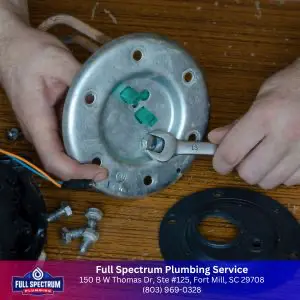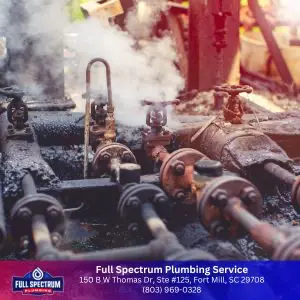The Role of Anode Rod Replacement in Hot Water Heater Maintenance: Preventing Corrosion
The Role of Anode Rod Replacement in Hot Water Heater Maintenance: Preventing Corrosion
Do you take your hot water heater for granted? While many households in America rely on hot water heaters to provide them with a regular supply of hot running water, few understand the importance of regularly maintaining these systems.
At the core of any successful maintenance plan should be anode rod replacement—a practice that can go a long way in preventing corrosion damage and costly repair bills down the line.
If you want to keep your family safe from chemical contamination due to corroding tanks and enjoy cost savings from decreased repairs, then read on!
What Is The Purpose Of Anode Rod In A Hot Water Heater?
The anode rod, often referred to as a sacrificial rod, is a vital component of any hot water heater. Made from magnesium, aluminum, or zinc, this rod is designed to prevent corrosion inside the water tank. The anode rod does this through electrolysis, where it sacrifices itself to corrode instead of the steel tank.
Over time, the anode rod degrades, which is a natural and expected process. Its primary purpose is to extend the water heater‘s life by protecting it from rust and corrosion.
Why Should The Anode Rod Be Replaced?

Inspecting and replacing the anode rod regularly is a cost-effective way to protect your investment and ensure your hot water system operates efficiently. Typically, anode rods need replacement every 3 to 5 years, but this can vary based on water quality and usage.
How Do You Prevent Corrosion In A Hot Water System?
Regular Flushing

Over time, water heaters accumulate sediment at the bottom of the tank, especially in areas with hard water. This sediment, primarily composed of minerals and debris, acts as a catalyst for corrosion. By flushing the tank annually, you remove this sediment, thereby reducing the risk of corrosion and improving the efficiency of the water heater.
Control Water Temperature
High temperatures in the water heater can accelerate the corrosion of the anode rod and the tank. It’s advisable to keep the water temperature at the manufacturer’s recommended setting, typically around 120-130 degrees Fahrenheit. This not only prolongs the life of the anode rod but also prevents the overheating of water, which can cause additional stress on the water heater.
Invest in a Water Softener
In areas with hard water, the installation of a water softener can be a game-changer. Hard water contains high levels of calcium and magnesium, which contribute to the buildup of sediment and hasten the corrosion of both the anode rod and the tank.
A water softener removes these minerals from the water, thus mitigating their impact on the water heater components. This not only helps in reducing corrosion but also enhances the overall performance and efficiency of the water heating system.
Homeowners can effectively prevent corrosion in their hot water systems by combining these strategies – regular anode rod inspection and replacement, tank flushing, temperature control, and water softening. This proactive approach ensures the water heater’s longevity and maintains its efficiency and safety, providing peace of mind and a consistent hot water supply.
What Is The Maintenance of the Anode Rod On A Water Heater?

It’s also wise to consult your water heater’s manual for specific recommendations regarding anode rod maintenance, as different models may have different requirements. Regular maintenance extends the life of not only the anode rod but also the water heater itself, ensuring that it remains efficient and effective in providing hot water for your home.
Full Spectrum Plumbing Services: Your Ally in Water Heater Maintenance
At Full Spectrum Plumbing Services, we’re dedicated to providing the highest level of care for your hot water heater. Our team of skilled professionals brings extensive expertise in managing every aspect of water heater maintenance, especially in preventing and addressing corrosion.
Unmatched Expertise: Our technicians have deep knowledge of water heater systems, ensuring that your anode rod replacement and maintenance are handled efficiently. We don’t just replace parts; we provide a comprehensive check to ensure your system runs smoothly.
Customized Solutions: We understand that each home has unique needs. Whether dealing with hard water challenges or adjusting your system for optimal performance, we tailor our services to meet your specific requirements.
Preventive Approach: Our focus is on preventive maintenance. By addressing issues before they escalate, we save you from future costly repairs. Regular maintenance extends the life of your water heater and ensures it operates at peak efficiency.
Transparent Pricing: We believe in honest, upfront pricing. Our anode rod replacement services typically range from $150 to $300, depending on the type and model of your water heater.
Frequently Asked Questions
Q: How often should I replace my water heater’s anode rod?
A: Typically, anode rods should be replaced every 3 to 5 years, but this can vary based on your water quality and heater usage.
Q: What are the signs that my anode rod needs replacing?
A: Look out for rusty water or a sulfur smell in your hot water, which can indicate that the anode rod is no longer effective.
Q: Is anode rod replacement a costly process?
A: The cost is quite manageable, usually between $150 and $300, which is a small price compared to replacing a corroded water heater.
Q: Can I inspect the anode rod myself?
A: You can inspect it, but understanding its condition can be tricky. We recommend a professional assessment for accurate evaluation.
Choose Full Spectrum for Long-Lasting Hot Water Solutions
Refrain from letting water heater issues catch you off guard. Contact Full Spectrum Plumbing Services for comprehensive and reliable water heater maintenance, including expert anode rod replacement. Trust us to extend the life of your water heater while ensuring it runs efficiently and safely.
Call us today for a consultation or to schedule your next service. We’re here to provide you with lasting solutions and peace of mind.


